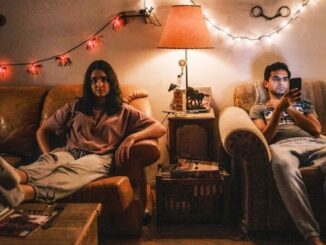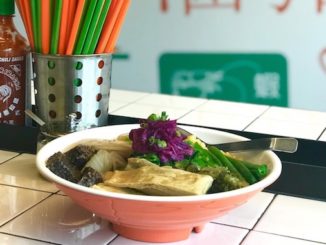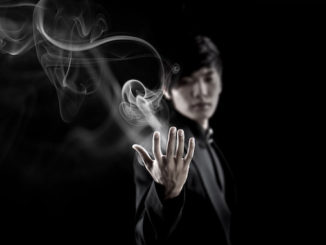In the upcoming documentary film COVEN, three millennial women explore what it means to identify as a witch in today’s world, part of a growing trend in reviving the practice and reclaiming the term “witch.” They set out to discover if the rituals, lore and sacred spaces of their ancestors can help them channel their gifts, confront their obstacles and claim their power. All three seek mentors and people like themselves, and travel to far away destinations looking for answers.
COVEN, directed by Rama Rau, is set to have its World Premiere at the 2023 Hot Docs Film Festival (April 27 to May 7) here in Toronto.
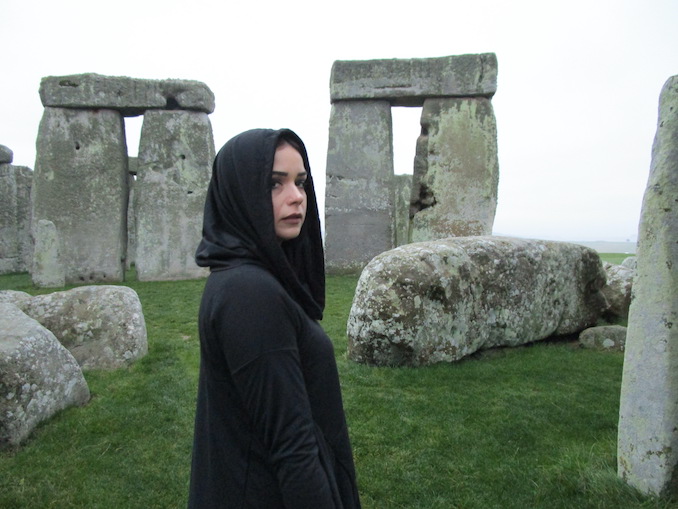
Ayo Leilani, a.k.a. Witch Prophet, is a Toronto singer, of East African descent, raised in Toronto by devoutly Christian parents, who began exploring the occult as a teen. Jamaicans she knew accused her of being an Obeah woman (a Caribbean sorceress), but their fear led her to a Jamaican guru who counseled her on her abilities and then disappeared.
Haunted by dreams in which she’s a 19th Century Russian author and mystic, she travels to New Orleans for advice from Queen Erzulie, founder of a Black Witches movement.
Laura Hokstad, a “solitary witch” in Toronto, seeks both the “coven” experience and an exploration of her heritage. She discovers, via travels to Scotland and Salem, Massachusetts, that two of her ancestors were women actually accused of witchcraft. She, it seems, is carrying on a family tradition.
Andra Maria Zlatescu, an artist/witch, fled Romania as a child with her parents, grew up with her grandmother’s stories of the spirits surrounding her. Andra travels to meet with Mihaela Minca, reputedly Eastern Europe’s most powerful witch (and her witch-clan family) on the outskirts of Bucharest. There she is taken to a seemingly haunted forest to commune with spirits and reconnect with the forces that empower her.
“Making this film has been a wild and completely unexpected journey that took me and the crew to far-flung lands: where Dracula had roamed, where Druids worshipped at Stonehenge, and to Salem, where witches were hunted ruthlessly,” says Director Rama Rau. “Witch hunts have always been about men’s fear of women. Making this film is a necessary act, so women can take back their power and re-tell their stories with magic, language and memory.”
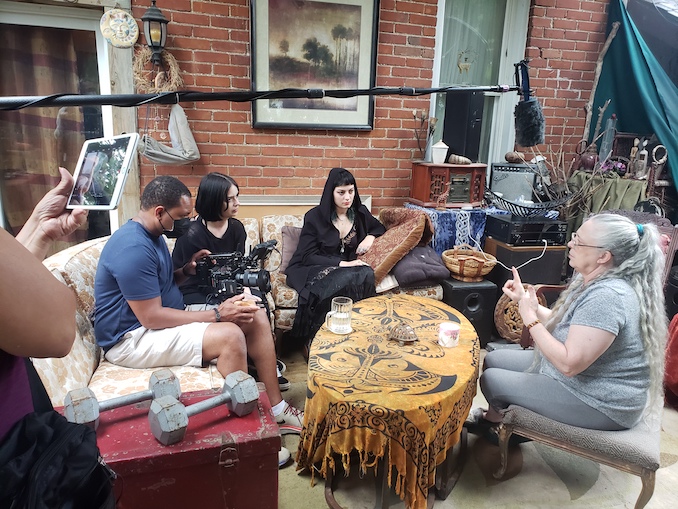
We had the opportunity to speak with Laura Hokstad, who identifies as a real-life witch and calls Toronto home.
How, or when, did you realize you identified as a witch?
Laura: That is a hard question for me to nail down an exact time. I think I really knew at a young age that I was drawn to mystical ways of thinking, but I was stunted for a long while from bullying and this fear of not fitting in. It wasn’t until my 20s when I revisited those interests and practices, that I realized I was ignoring a large part of myself, and since then I have been working to reconnect with it. I think I am still learning what it means for myself and my identity as a witch. But certainly my experience in the documentary helped me a lot. It helped me connect my ancestry to a time and place that really made me feel like this thing I have been interested in for so long made sense.
What does it mean to be a solitary witch?
Laura: A solitary witch, to me, is someone who chooses to practice alone. I had never sought out other people who believed what I did. I think I kept to myself for many reasons, some being a fear of not being accepted, a fear of not being enough, a fear of those more experienced than me telling me I wasn’t a witch…. But outside of fear I am also a bit of an introvert. I feel I can recharge when I am alone, when I feel at my most centred, and I think that is why I choose to practice as a solitary witch.
From your experience do witches have different callings, beliefs and or practices?
Laura: Absolutely. I can only speak of my own experience, but others I know have found their practice/beliefs in varying ways. Each person I know connects to magic and witchcraft differently. Some friends may choose to practice in ways that were passed down by mothers and grandmothers. They build altars to honor the women who came before them and connect to their practice that way. Other people I know practice with their family, and still others have sought out covens and keep their practice very separate from their home life. I think however someone chooses to connect to their practice/beliefs is right for them. And I am still learning what that looks like for myself.
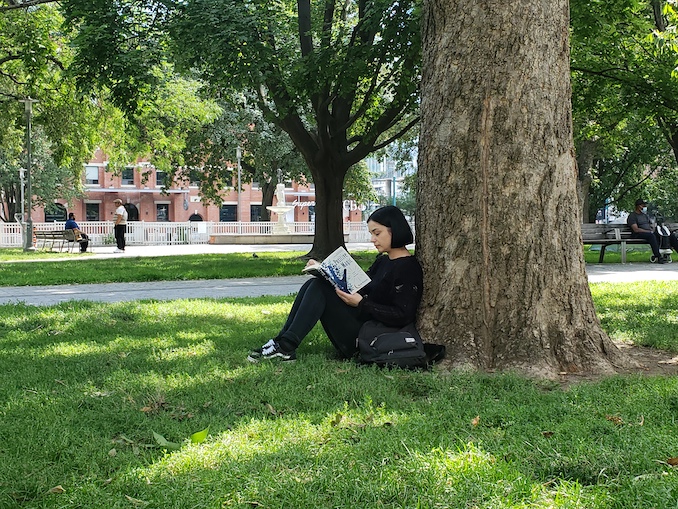
Did it surprise you that you had connections to the Salem Witch trials?
Laura: I was completely surprised! For as long as I can remember I have been fixated on the Salem witch trials. I used to tell my mum when I was younger that I thought I was killed during the trials in a past life. But I never explored that further until this documentary. This whole experience helped me connect a lot to my ancestry, and learning not only that my relatives were persecuted in Salem, that they were ALSO persecuted at the same time, across the ocean, in the Scottish witch trials… Well, that came as a shock! It was exciting but also painful. After the initial feelings subsided I found I was left with a feeling of anger or frustration at the whole situation. The witch trials are salacious, and exciting to talk about–but what we tend to lose in our conversations is the identities of these people and the reality of what they suffered and at whose hands they suffered. These women were not hiding in the woods cooking children in a cauldron, they didn’t have green skin or summon the devil…they were healers, they were intuitive women, they were smart, outspoken women, and that is why they were killed.
SO I think the knowledge that I am connected to it is bittersweet. It explains a lot for myself and why I feel drawn to witchcraft and those places, but it also hurts deeply and makes me feel very angry for the women who had to live and die during that time.
Since you’re from Toronto, what can you tell us about the witch community here?
Laura: As I have mostly been practicing as a solitary witch I haven’t met many folks in Toronto within the community. I will say Monica Bodirsky was a wonderful person to meet. Her teachings and the work she does for the community are very special. I would encourage anyone interested to check her out for classes and one-on-one work. I also participated in a New Moon ritual that was organized through the Rock Store a few years ago, and it too was very beautiful, and all the participants were very lovely.
I think within every set of beliefs there can be people who are in it for the wrong reasons, maybe have darker intentions–but I have been lucky for the most part to not have run into anyone like that. I had one experience years ago at a metaphysical store that has since closed down. A person I met there invited me to their coven, promised that I could manifest a car and riches…and I was really put off. This focus on the material was not what I was looking for. I will say that if you’re looking into this, just trust your intuition when meeting people, if it feels strange or makes you unsure then it is not the right fit for you.
How does someone connect with a coven? And what does a coven do?
Laura: A coven is a group of people who have come together because their practices align. Some covens follow the traditions of Wicca, or Alexandrian witchcraft. While others are more open in terms of their rituals and practices. Covens may observe a ceremony on the New or Full Moons and during sabbaths. There are some covens that have closed ceremonies, as in they do not invite new folks in. Some covens may hold a special ritual for new members who are interested, to meet people and see if that coven is a good fit for them.
You had mentioned starting your own coven, what does that entail?
Laura: The practices, ceremonies and processes of a witches coven are very private, but most of the time there is a high priest or priestess who oversees the coven. That kind of structure does not resonate with me, I wouldn’t want a coven to feel monarchical. What I would envision my ideal coven to be, would be more of a group where everyone is equal. I think what I would like to do first is connect with other women, or non-binary folks whose beliefs are similar to mine, and build from there. Start out as a gathering and see if it can progress to a coven, if everyone feels safe, supported and equal.
What do you wish people would know, or understand better about witches?
Laura: I think I would like people to know that witches carry a multitude of different beliefs, and not every witch’s practice is the same, but that doesn’t make one person’s practice better or more true than the next. I want people to know that witches are not synonymous with evil women. I would want people to know that the witches I know are wonderful people who feel a deep connection to our world, nature, and others. That the witches I know are caring mothers, friends, professionals, creatives, artists and seekers.
How can we tell if someone is an actual witch?
Laura: I would steer away from trying to tell who is an actual witch. It is that kind of gatekeeping that I think keeps people away. I think if someone is interested or feeling drawn to witchcraft for whatever reason, whether they saw it on TV, or in a book, or if they watch our documentary. All of those are valid reasons to explore it, and I would hope those within the community would welcome them.
However if you want a real list…Historically there was this book published in 1486 called The Malleus Maleficarum. This book was used to find out if someone was a witch.
Some of the “symptoms” of witchcraft detailed in the book are:
• being a woman (especially a midwife, as those women were seen as especially evil, and said to murder and consume children and babies)
• having a mole or birthmark (also called “The Witches Mark”)
• talking to yourself
• being seen riding a broomstick/owning a broom
• having pets/ also called “familiars” (having an animal companion could get you accused of witchcraft)
So really if any of those apply then you might know a witch!
What are your favourite occult, crystals, and other shops and places to connect with others in Toronto?
Laura: There are so many good shops in town; one that I go to often is Alternative Thinking at Bathurst and Bloor. For herbs and crystals, a shop on Queen Street West that is reasonably priced is Herbie’s Herbs. For anyone getting into crystals or tarot, Happy Soul (on Bloor West near Dovercourt) is so friendly and inviting and often has classes for beginners. The Rock store (on Harbord Street) is also a wonderful store for tarot cards and books. If people are more advanced in their practice or looking for a large assortment of herbs for spell work–The Occult Shop (on Bathurst near St. Clair) is very good as well.
Visit the official site for the documentary COVEN here.
COVEN will have its World Premiere at the Hot Docs Film Festival 2023.
• April 28 at 8:45pm. TIFF Bell Lightbox, Cinema 1
• Additional screening: May 5 at 6:00pm. TIFF Bell Lightbox, Cinema 2
• Available for Streaming Online Across Canada: May 5


